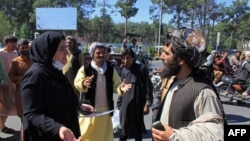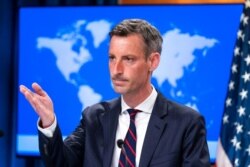White House officials said Thursday that U.S. involvement with Afghanistan’s Taliban rulers had entered an uncertain new phase, as U.S. officials continued working to evacuate about 100 Americans still in the country.
Meanwhile, Taliban officials indicated that their fledgling government was strengthening ties with China and other nations.
White House press secretary Jen Psaki said the U.S. no longer controlled the airspace over Afghanistan. So far, she said, 31,107 people have been brought to the U.S., of the more than 120,000 who have been evacuated in what administration officials have described as the largest airlift in history.
Also Thursday, a Taliban spokesman said via Twitter that a top Taliban official had spoken to a top Chinese official.
“The Chinese Deputy Foreign Minister said that they would maintain their embassy in Kabul, adding our relations would beef up as compared to the past,” tweeted Suhail Shaheen, an English-language spokesman for the group.
There was no immediate confirmation from Beijing, Agence France-Presse reported.
Other Taliban officials said on Twitter that they were holding diplomatic meetings with Britain and Germany. Qatar and Turkey also were helping the new Afghan government set up the main airport in Kabul.
Psaki said the U.S. was, for now, watching and waiting to engage with the new, unelected government. She stressed that the U.S. maintained nonmilitary leverage, through access to global markets and financial assistance, over the new government.
“No one is saying in the federal government, no one — the president, the secretary of defense, nor from the intelligence community — that the Taliban are good actors,” she said. “We are not saying that. That is one of the reasons we are being so clear, that we are not rushing to recognition. We will be watching.”
State Department spokesperson Ned Price said the diplomatic corps would also move cautiously in assisting the new government.
“There is a review of our assistance to the Afghan government," Price said in response to a reporter's question. "Now we're in a position where there is not yet a new government formed. So in the first instance, we'll need to see government formation take place. That is a mere technicality. … What we will be looking to when it comes to the issues that you've raised, including the potential for any forms of assistance, will be the actions of the new Afghan government.”
Specifically, he said, the U.S. will prioritize “safe passage, respect for the rights of the people of Afghanistan, including women and girls and minorities, a government that is inclusive, a government that follows through on its counterterrorism commitments, a government that respects the universal international norms.”
Rebel movement
In setting up a new government, the Taliban also face challenges from within their borders, notably from the National Resistance Front, the revived rebel movement led by the son of famed mujahedeen commander Ahmad Shah Massoud.
His British-educated son has returned to Afghanistan, and, in an editorial in the Washington Post, vowed to fight for “an open society, one where girls could become doctors, our press could report freely, our young people could dance and listen to music or attend soccer matches in the stadiums that were once used by the Taliban for public executions — and may soon be again.”
Military officials said the U.S. could still counter terrorism in the region, though “the U.S. military mission in Afghanistan is over,” said Pentagon spokesman John Kirby.
“What we will do is continue to be able to conduct over-the-horizon terrorism strikes as needed for threats to our interests and to the homeland,” he said. “That’s a different thing than saying that we have an enduring military mission in Afghanistan.”
VOA's Jeff Seldin and Cindy Saine contributed to this report. Some information came from Agence France-Presse.







